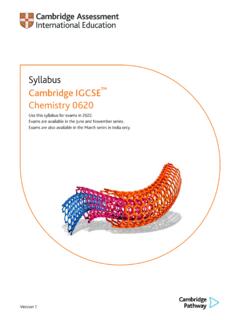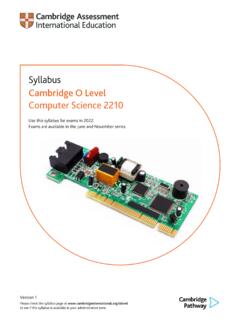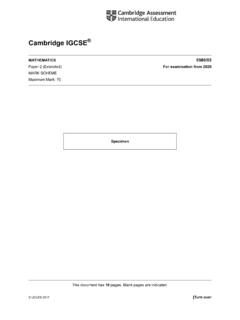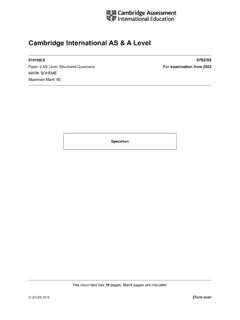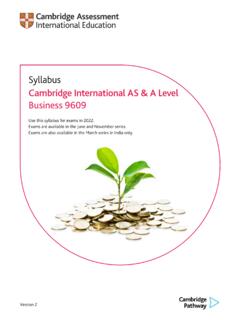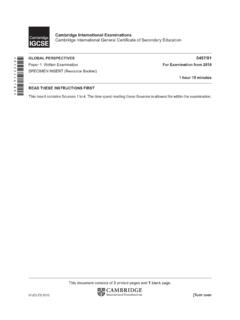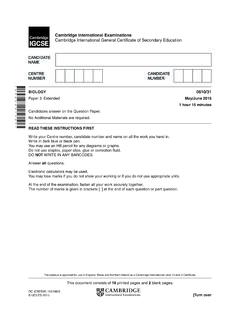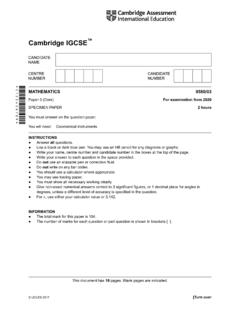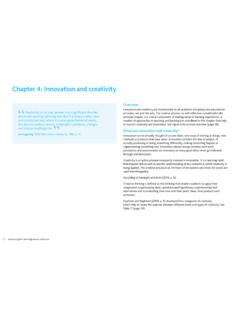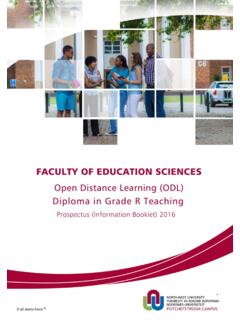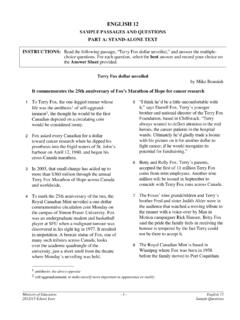Transcription of Syllabus Cambridge IGCSE Biology 0610
1 Version 1 Use this Syllabus for exams in are available in the June and November are also available in the March series in India IGCSE Biology 0610 Why choose Cambridge International? Cambridge International prepares school students for life, helping them develop an informed curiosity and a lasting passion for learning. We are part of the University of Cambridge Pathway gives students a clear path for educational success from age 5 to 19. Schools can shape the curriculum around how they want students to learn with a wide range of subjects and flexible ways to offer them. It helps students discover new abilities and a wider world, and gives them the skills they need for life, so they can achieve at school, university and programmes and qualifications set the global standard for international education. They are created by subject experts, rooted in academic rigour and reflect the latest educational research. They provide a strong platform for learners to progress from one stage to the next, and are well supported by teaching and learning mission is to provide educational benefit through provision of international programmes and qualifications for school education and to be the world leader in this field.
2 Together with schools, we develop Cambridge learners who are confident, responsible, reflective, innovative and engaged equipped for success in the modern year, nearly a million Cambridge students from 10 000 schools in 160 countries prepare for their future with the Cambridge Pathway. We think the Cambridge curriculum is superb preparation for university. Christoph Guttentag, Dean of Undergraduate Admissions, Duke University, USAQ uality managementCambridge International is committed to providing exceptional quality. In line with this commitment, our quality management system for the provision of international qualifications and education programmes for students aged 5 to 19 is independently certified as meeting the internationally recognised standard, ISO 9001:2015. Learn more at UCLES September 2019 Cambridge Assessment International Education is part of the Cambridge Assessment Group. Cambridge Assessment is the brand name of the University of Cambridge Local Examinations Syndicate (UCLES), which itself is a department of the University of Cambridge .
3 UCLES retains the copyright on all its publications. Registered centres are permitted to copy material from this booklet for their own internal use. However, we cannot give permission to centres to photocopy any material that is acknowledged to a third party even for internal use within a Why choose this Syllabus ? ..22 Syllabus overview ..5 Aims 5 Content overview 6 Assessment overview 7 Assessment objectives 83 Subject content ..104 Details of the assessment ..48 Core assessment 48 Extended assessment 48 Practical assessment 49 Glossary of terms used in science papers 515 Appendix ..52 Safety in the laboratory 52 Mathematical requirements 52 Presentation of data 53 ICT opportunities 54 Conventions ( signs, symbols, terminology and nomenclature) 546 What else you need to know ..55 Before you start 55 Making entries 56 After the exam 57 How students and teachers can use the grades 57 grade descriptions 57 Changes to this Syllabus for 2022 58 Changes to this syllabusFor information about changes to this Syllabus for 2022, go to page latest Syllabus is version 1, published September 2019.
4 There are no significant changes which affect textbooks endorsed to support the Syllabus for examination from 2016 are still suitable for use with this IGCSE Biology 0610 Syllabus for 2022. to contents page1 Why choose this Syllabus ? Key benefitsCambridge IGCSE is the world s most popular international qualification for 14 to 16 year olds, although it can be taken by students of other ages. It is tried, tested and trusted. Students can choose from 70 subjects in any combination it is taught by over 4700 schools in 150 IGCSE Biology enables learners to: increase their understanding of the technological world take an informed interest in scientific matters recognise the usefulness (and limitations) of scientific method, and how to apply this to other disciplines and in everyday life develop relevant attitudes, such as a concern for accuracy and precision, objectivity, integrity, enquiry, initiative and inventiveness develop an interest in, and care for, the environment better understand the influence and limitations placed on scientific study by society, economy, technology, ethics, the community and the environment develop an understanding of the scientific skills essential for both further study and everyday programmes balance a thorough knowledge and understanding of a subject and help to develop the skills learners need for their next steps in education or employment.
5 Our approach in Cambridge IGCSE Biology encourages learners to be:Cambridgelearner The strength of Cambridge IGCSE qualifications is internationally recognised and has provided an international pathway for our students to continue their studies around the world. Gary Tan, Head of Schools and CEO, Raffles International Group of Schools, IndonesiaCambridge IGCSE Biology 0610 Syllabus for 2022. Why choose this Syllabus ? to contents pageInternational recognition and acceptanceOur expertise in curriculum, teaching and learning, and assessment is the basis for the recognition of our programmes and qualifications around the world. The combination of knowledge and skills in Cambridge IGCSE Biology gives learners a solid foundation for further study. Candidates who achieve grades A* to C are well prepared to follow a wide range of courses including Cambridge International AS & A Level IGCSEs are accepted and valued by leading universities and employers around the world as evidence of academic achievement.
6 Many universities require a combination of Cambridge International AS & A Levels and Cambridge IGCSEs or equivalent to meet their entry NARIC, the national agency in the UK for the recognition and comparison of international qualifications and skills, has carried out an independent benchmarking study of Cambridge IGCSE and found it to be comparable to the standard of GCSE in the UK. This means students can be confident that their Cambridge IGCSE qualifications are accepted as equivalent to UK GCSEs by leading universities more at Assessment International Education is an education organisation and politically neutral. The content of this Syllabus , examination papers and associated materials do not endorse any political view. We endeavour to treat all aspects of the exam process neutrally. Cambridge IGCSE is one of the most sought-after and recognised qualifications in the world. It is very popular in Egypt because it provides the perfect preparation for success at advanced level programmes.
7 Managing Director of British School in Egypt BSEC ambridge IGCSE Biology 0610 Syllabus for 2022. Why choose this Syllabus ? to contents pageSupporting teachersWe provide a wide range of practical resources, detailed guidance, and innovative training and professional development so that you can give your students the best possible preparation for Cambridge preparation resources Question papers Mark schemes Example candidate responses to understand what examiners are looking for at key grades Examiner reports to improve future teaching CommunityYou can find useful information, as well as share your ideas and experiences with other teachers, on our social media channels and community out more at Introductory face-to-face or online Extension face-to-face or online Enrichment face-to-face or online Coursework online Cambridge Professional Development QualificationsFind out more at resources School Support Hub Syllabuses Schemes of work Learner guides Discussion forums Endorsed resourcesSupport for Cambridge IGCSEC ambridge IGCSE Biology 0610 Syllabus for to contents page2 Syllabus overview AimsThe aims describe the purposes of a course based on this Syllabus .
8 You can deliver some of the aims using suitable local, international or historical examples and applications, or through collaborative experimental aims are to: provide an enjoyable and worthwhile educational experience for all learners, whether or not they go on to study science beyond this level enable learners to acquire sufficient knowledge and understanding to: become confident citizens in a technological world and develop an informed interest in scientific matters be suitably prepared for studies beyond Cambridge IGCSE allow learners to recognise that science is evidence-based and understand the usefulness, and the limitations, of scientific method develop skills that: are relevant to the study and practice of Biology are useful in everyday life encourage a systematic approach to problem-solving encourage efficient and safe practice encourage effective communication through the language of science develop attitudes relevant to Biology such as: concern for accuracy and precision objectivity integrity enquiry initiative inventiveness enable learners to appreciate that: science is subject to social, economic, technological, ethical and cultural influences and limitations the applications of science may be both beneficial and detrimental to the individual, the community and the IGCSE Biology 0610 Syllabus for 2022.
9 Syllabus overview to contents pageContent overviewCandidates study the following topics:1 Characteristics and classification of living organisms2 Organisation of the organism3 Movement in and out of cells4 Biological molecules5 Enzymes6 Plant nutrition7 Human nutrition8 Transport in plants9 Transport in animals10 Diseases and immunity11 Gas exchange in humans12 Respiration13 Excretion in humans14 Coordination and response15 Drugs16 Reproduction17 Inheritance18 Variation and selection19 Organisms and their environment20 Biotechnology and genetic engineering21 Human influences on ecosystems Support for Cambridge IGCSE BiologyThe School Support Hub is our secure online site for Cambridge teachers where you can find the resources you need to deliver our programmes, including schemes of work, past papers, mark schemes and examiner reports. You can also keep up to date with your subject and the global Cambridge community through our online discussion IGCSE Biology 0610 Syllabus for 2022.
10 Syllabus overview to contents pageAssessment overviewAll candidates take three who have studied the Core subject content, or who are expected to achieve a grade D or below, should be entered for Paper 1, Paper 3 and either Paper 5 or Paper 6. These candidates will be eligible for grades C to G. Candidates who have studied the Extended subject content (Core and Supplement), and who are expected to achieve a grade C or above, should be entered for Paper 2, Paper 4 and either Paper 5 or Paper 6. These candidates will be eligible for grades A* to candidates take:Extended candidates take:Paper 1 45 minutes Multiple Choice (Core) 30%40 marks40 four-option multiple-choice questionsQuestions will be based on the Core subject contentExternally assessedPaper 2 45 minutes Multiple Choice (Extended) 30%40 marks40 four-option multiple-choice questionsQuestions will be based on the Extended subject content (Core and Supplement)Externally assessedand Core candidates take:and Extended candidates take:Paper 3 1 hour 15 minutes Theory (Core) 50%80 marksShort-answer and structured questionsQuestions will be based on the Core subject contentExternally assessedPaper 4 1 hour 15 minutes Theory (Extended) 50%80 marksShort-answer and structured questionsQuestions will be based on the Extended subject content (Core and Supplement)Externally assessedAll candidates take either: or.
